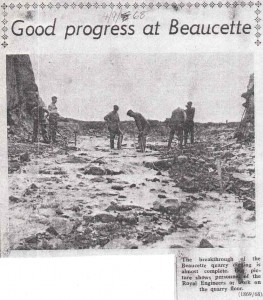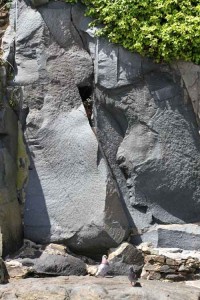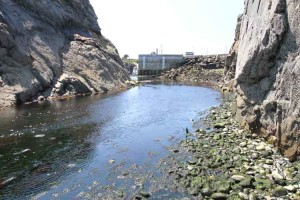Guernsey quarries

The Royal Engineers creating Beaucette Marina from Beaucette quarry.
Picture taken 4 September 1968
click to enlarge
In the 19th century, quarrying was Guernsey’s major industry with 268 quarries being actively worked. Many were hundreds of feet deep and most of the extracted granite was crushed and transported by ship for making roads in the UK. Today, some are used as water reservoirs whilst others have been filled by waste disposal.
The granite of especial interest was the immensely hard blue Diorite granite some of which was used in for the steps of St Paul’s Cathedral, London.
Beaucette quarry
The disused quarry at Beaucette in Guernsey’s north east parish of Vale, had been bought by Vale Investments Ltd. Given its location close to the sea the plan was to create a marina. But there was one major obstacle – a substantial cliff wall was in the way.
Quotations were obtained from local companies, but the enterprising owner had an idea and contacted The Royal Engineers to ask if they’d like something to blow up – for training purposes, of course.
After a full reconnaissance had been made, it was estimated one officer and nine men could complete the work in just three weeks. With Ministry of Defence approval given on 18th June, 1968, Vale Investments Ltd accepted The Royal Engineer’s estimate of £725 plus the cost of explosives.
The Royal Engineers come to Beaucette, Guernsey
Work began in early July 1968, but it was quickly realised that the original estimate was extremely optimistic. The reasons were threefold. The ‘normal’ method of loosening rock by boring holes from the top proved unsuccessful due to the immense strength of the Guernsey granite; the hope that the weight of water plus the effect of the tides would be sufficient to open the channel – but it wasn’t; and finally, a severe storm deposited 600 tons of previously excavated rock back into the opening. Hence, the work would take a great deal longer, and be more expensive than had been expected.
Work was suspended on 8th October 1968 pending a further reconnaissance in November to assess the situation and plan for completion of the task.
With 80% of the rock already removed, it was concluded that work could be completed using 2 officers and 60 other ranks between 17th February to 6th June 1969.
The costs
Rather than the original 3 weeks for 10 men, the work took over 7 months and involved more than 60 men.

The immensely strong dark grey Diorite granite can be found in specific places in the walls of Beaucette Marina.
The drilling for the explosives are visible at the top of the picture
click to enlarge
From the original £725 plus explosives, it cost some £27,000 including the pay and allowances of the officers and men, but excluding expenses such as accommodation, transportation, use of equipment, and the heavy equipment which had been left at the bottom of the quarry and which remains there to this day.
In the end, matters were settled at a total of £3,300 by Vale Investments ltd, being the original estimate plus a £1,000 ex-gratia payment, and Beaucette Marina, Guernsey, was born.
Questions raised in the House of Commons
On 16th February 1970, further questions were raised in the House of Commons by Mr Roy Roebuck, MP for Harrow East, on the suitability of using the British Army for this type of work.
‘Men of the Royal Engineers blasted rocks (at Beaucette) to facilitate the construction of a yachting marina for a private enterprise company, Vale Investments Ltd. Work costing at least £32,910 has been done for the company, of which the taxpayers have recovered only £3,300. There is a strong presumption, which I hope my hon. Friend will be able to rebut, that the Army has been used as cheap—indeed, free—labour by a private enterprise company to construct a haven for rich men’s yachts.
‘A significant point here is that the people of Guernsey do not contribute a brass farthing to the upkeep of the Services, although many of them are very rich. Indeed, Guernsey is not part of the United Kingdom; it is a Crown dependency which has a special relationship with the United Kingdom because of its proximity and the antiquity of its connection with the Crown. Many of its people are extremely rich, and it is my contention that any work there by agencies sustained by the United Kingdom taxpayer — save possibly acts of mercy carried out at times of emergency — should be paid for in full.
‘The people of Guernsey are taxed at only 4s (20p) in the £, cigarettes cost 2s 2d (11p) for 20, whisky is 32s 6d (£1.63p) a bottle and premium petrol 3s 4d (17p) a gallon. I can see no reason why my constituents are required to dip into their pockets to assist the civil population of Guernsey.’
After debate, Mr Robert Cooke, MP for Bristol West, replied,
‘The Channel Islanders, who are not represented in this House, have been completely vindicated by what the Minister (of Defence for Administration) has said. Obviously the hon. Member for Harrow East…was right to raise the matter. I am very glad…that the Minister has been able in this short debate to prove that what took place was a valuable piece of training, and that there is nothing wrong in private enterprise sometimes being involved in something to the community’s good. I am grateful to the Minister for what he said.
‘I am sure that the motives of the hon. Member for Harrow East in raising the matter in the House were nothing but good. If there was any confusion, I am sure that it is now all settled. As for the rich man’s playground, I gather that this is sometimes enjoyed by the most humble people, who like to get out of the United Kingdom and away from some of the rigours…’
The debate occupied the House for 28 minutes.
Success all round
As was said in the House, on the one hand the exercise at Beaucette quarry was seen as first class training for the Royal Engineers in quarry and rock blasting made unique given the hardness of the granite whilst on the other hand, the Islanders benefitted. Furthermore, it was agreed that responsibility for future estimates would be taken at a higher level than just those concerned, and that instructions had been issued that the assessment of costs must be made with the greatest possible accuracy in future.
Piers
from the library of
Play d’eau
Fleming 55
You can get in touch with us any time by using our Contact Form.
 Piers and Lin du Pré bought their new Fleming 55 / 129, Play d'eau, in 2003.
Piers and Lin du Pré bought their new Fleming 55 / 129, Play d'eau, in 2003.